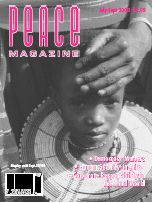
Peace Magazine Jul-Sep 2000, page 29. Some rights reserved.
Search for other articles by Ron Shirtliff here
Douglas Roche Uniiversity Of Alberta Press, 2000. 162 Pp.
A lot of good people come out of the Canadian West. Consider Douglas Roche, from Alberta: Elected to Parliament four times (Conservative); appointed in 1984 by Mulroney as Canada's Ambassador for Disarmament to the United Nations, where he chaired the U.N. Disarmament Committee in 1988; then, surprisingly, appointed by Chretien in 1998 to the Canadian Senate, and, more surprisingly, allowed to sit as an independent, freeing him to work outside party constraints to specialize in development and disarmament, peace, and justice. What qualities does it take to convince Prime Ministers that they should allow a man of note to rise beyond their partisan control? The answers are to be found in Douglas Roche's latest book, Bread, not Bombs.
Ten years after the supposed end of the Cold War, a rational person who hopes to modify the obscene realities of nuclear weapons, military expenditures, poverty, and injustice must have passion and fortitude. One could be forgiven for railing at the darkness, but Roche lights a candle to confront the problems.
He starts his analysis at home in Alberta and the Klein belt-tightening for the poor: An inner city minister said that before the cuts, his church gave out food to 400 persons a month; in two years the number jumped to 3,000. He goes on to look at national developments: In 1973, the richest 10 percent of families with children under 18 made 21 times more than the poorest 10 percent of Canadian families. In 1996, the richest 10 percent of families made 314 times more than the poorest 10 percent of Canadian families. On the international scene, aid from the rich nations to the poor has dropped as a percent of rich nations' GNP.
"The Cold War is Not Over" is the title of chapter two. The world has received no peace dividend which could contribute to development and justice, but instead violent deaths continue. In the past decade, two million children have been killed in armed conflicts; four to five million disabled and more than 12 million made homeless. The arms trade continues to thrive, rising now while development assistance declines. Roche argues that war is not inevitable, but we must reinvest the dividends of peace into development and justice, or forever be locked in the insecurity which fuels arms races that approach the level of the Cold War era.
Human development, he argues, is no longer a question of charity. As we must by law protect the civil and political rights of individuals, so too we must legislate the protection of the world's poor. Only a pursuit of justice for all can break the insecurity that fuels the perceived need for bombs. The crippling Third World debt ensures ongoing poverty, whereas the Tobin tax, controlled by an equitable United Nations, would fund sustainable development for all.
Canada faces a dilemma. Leaders in international peacekeeping through the United Nations, we are also a member of NATO, which frequently means toeing the U.S. line on issues of nuclear weapons, and confrontational approaches to war and peace as we witnessed in Kosovo.
The final issue is one of values. Our mainline media dwells on the confrontational rather than the creative, leaving no space for the great moral issues of how to treat our fellow men. But now we can reach each other directly through the Internet and may be able to help turn the tide. I hope his faith is well founded. We did get action against landmines; now we may go after the guns and other bombs.
The argument reveals the qualities of the man. Roche is ever the diplomat, weighing the realities and the problems; ever the speaker of truth, the moral man, the prophet, warning us that we must choose between compassion and ruthless control which may lead to the unthinkable, the untimely end of us all.
Read Bread, Not Bombs as a path for a rational, moral person .
Reviewed by Ron Shirtliff, an editor of Peace Magazine.

Peace Magazine Jul-Sep 2000, page 29. Some rights reserved.
Search for other articles by Ron Shirtliff here